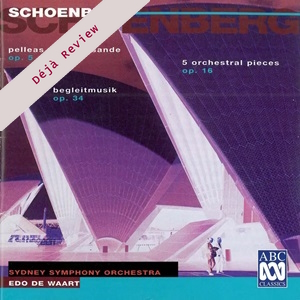
Déjà Review: this review was first published in June 2002 and the recording is still available.
Arnold Schoenberg (1874-1951)
Pelleas und Melisande, Op 5 (1902-3)*
Accompaniment Music for a Film Scene, Op 34 (1929-30)
Five Orchestral Pieces, Op 16 (1909 rev.1949)
Sydney Symphony Orchestra / Edo de Waart
rec. 1994 and 1996*, Concert Hall of Sydney Opera House
ABC Classics 454 514-2 DDD [70]
Richard Strauss really missed the point (fully related in the excellent notes) when he decided that Schoenberg had gone too far this time, ripe, he thought, for the attentions of an analyst. When Schoenberg decided to stop trying to be Richard Strauss and start being himself, he made a creative breakthrough.
For many years it has been fashionable to consider Arnold Schoenberg as a great theorist, a great teacher, a great pioneer of music, but not necessarily a great composer. This disc forced a reconsideration on your reviewer for it presents both sides of the divide, Schoenberg pre-Strauss and post-Strauss, and the shock of discovery felt with the latter is considerable. Pelleas und Melisande is a good work, full of passion and angst but ultimately lacking the ingredients that Richard Strauss always brought to his scores, excitement and thumping good tunes. Arnold Schoenberg could write tunes, in Verklärte Nacht for example, but nothing like the great lyric outbursts of Salome’s Dance, or the 10th Variation of Don Quixote. The reason now seems obvious. Schoenberg was not Strauss. In the Five Pieces and the Accompaniment Music for a Film Scene, he found his own way. This music is dramatic, violent and atmospheric, and, yes, still full of angst, as befits a member of Freud’s Viennese society.
It is ironic that Strauss should have started to move away from this sort of thing, away from Elektra especially, just as Schoenberg made his way towards modern expressionism. But the two diverging pathways did give us the genius of, on the one hand, the Chamber Symphonies, and on the other hand the Four Last Songs and the Oboe Concerto. In the long run, both routes were fruitful. One wonders if Schoenberg would have wanted the approval of the composer of Der Rosenkavalier anyway. Would he perhaps have decided that such approval indicated that he was not radical enough? We could have had the Schoenberg of the blind alley. One who wrote like, say, Varèse, and led nowhere, rather than the pioneer of the path which gave us Berg and Webern as well as the extraordinary serial compositions of Schoenberg himself.
The Sydney Orchestra play brilliantly. Edo de Waart conducts to the manner born. The ABC engineers serve up a very fine recording, detailed but coherent sound that gives you this dynamic music with no holds barred. A magnificent disc, even for the great almost-achievement of Pelleas. A final confession. Having been struck by several Antipodean issues in recent weeks, I suppose I just have to stop being surprised at how good the orchestras are. The fact that there aren’t all that many Antipodeans has had as little effect on the quality of their musicians as has the shortage of Finns on their extraordinary musical fecundity. The Sydney Orchestra is as good as any I have heard, the playing by various wind and string soloists here being utterly superb.
Dave Billinge
Buying this recording via a link below generates revenue for MWI and helps us keep free access to the site


















